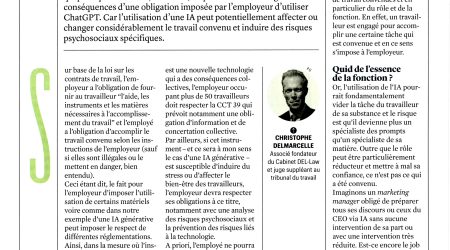Unilateral change of position by employer
Posted the 10 September 2013The issue of unilateral changes to employment conditions is very complicated in Belgian labor law. In short: even if the employment contract contains a change clause, your employer cannot unilaterally alter the employment conditions that are contractually defined and considered essential, such as the job position or the place of employment. Such a change can, if it is a significant change, even be considered a termination of the employment contract after a formal notice. This is called 'constructive dismissal'. However, this is only the case if the change in position was actually implemented, as the employer's intent alone is not sufficient.
When an employer faces an employee who refuses the job change, they may sometimes threaten to dismiss the employee for urgent reasons due to refusal to work. Generally, labor courts will not agree with this because the employer did not have the right to impose the change unilaterally on the employee. Therefore, there is no refusal to work. In two cases, however, the court may still recognize the urgent reason. The first is when the employee initially accepted the change and only later refused it. This acceptance can even be implicit, such as continuing to work for months under the modified conditions. The second is when the change is minor and temporary, although there is still considerable debate on this matter.
If you disagree with your employer's proposal, you should respond in writing (via email or letter) as soon as possible, specifying which change is involved and stating that it concerns a change in an essential employment condition. You refuse to accept the change and give the employer formal notice to restore you to your previous position; otherwise, you reserve the right to take other measures, such as judicial termination or constructive dismissal, but this solution can be risky.4o mini
Related articles

Is an employer allowed to mandate the use of artificial intelligence tools by employees ? (Trends, 17-07-2025)

Caution if a former colleague opposed to your employer asks you to testify in their favor
